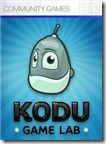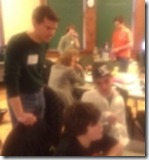Teaching Teachers and Students Together
 The other day Chris Bowen (that’s Chris working with students below) and I gave a Kodu workshop for a group of students and teachers in Vermont. This was a train the trainer sort of work shop and the students will be acting as peer tutors as part of after school programs in their local schools. Some of the adults were teachers from the same schools while others were teacher trainers from the Digital Wish program who organized the workshop.
The other day Chris Bowen (that’s Chris working with students below) and I gave a Kodu workshop for a group of students and teachers in Vermont. This was a train the trainer sort of work shop and the students will be acting as peer tutors as part of after school programs in their local schools. Some of the adults were teachers from the same schools while others were teacher trainers from the Digital Wish program who organized the workshop.
Having both students who ranged from about 6th grade though high school and adults in the same workshop was pretty interesting. Generally speaking the adults asked more questions. The students tended to try more things before asking. One might expect adults to hesitate about asking for help in front of students but that was not the case. These adults were there to learn and if asking questions helped they were ready and willing to do so. In fact stopping teachers from asking questions seems just about impossible in my experience. It is one of the things I love about doing workshops for teachers.
As I said before the students were rushing ahead to try things. They also wanted to learn but at their age discovery and trial and error appear to be the preferred way to learn. And learn they did! Kodu is one of those wonderful tools where you can point students in a general direction and get out of the way. We had some of the students demo projects at the end of the day and I must say I was impressed with how much they learned. It was more than I was able to teach them. I call that success!
The adults learned a lot as well of course. It was interesting to see that while the students didn’t pay a lot of attention to what the adults were doing the adults were positively energized by watching the students. This is not really surprising in either case. Kids are notorious for not being able to see beyond themselves. Teachers are well known for thriving on the success of their students. It is the ability to push students forward and enjoy their success that makes people good teachers (among other things of course).
My last big observation is that the teacher’s minds were racing with a different set of ideas than the students. The students were interested in “playing” while the teachers were seeing things like:
- Problem solving
- logical thinking
- debugging
- story boarding
- teamwork
And all sorts of other things students were and would be learning through the process. It’s as if mental light bulbs were going off all over the room. I can’t wait to see what all of these students – adult and school age alike – come up with in the coming weeks and months.
